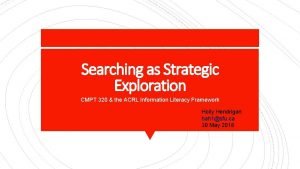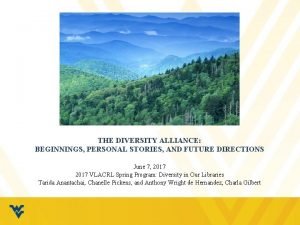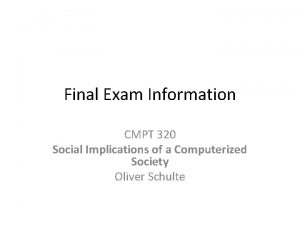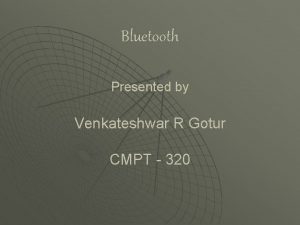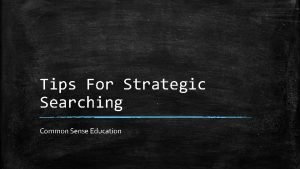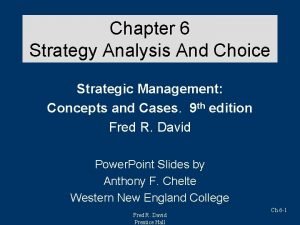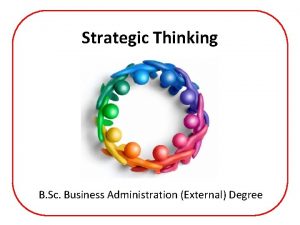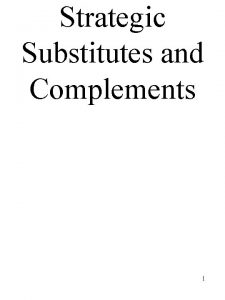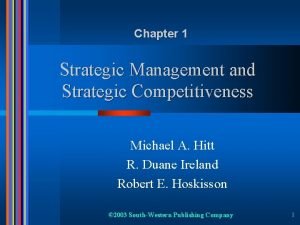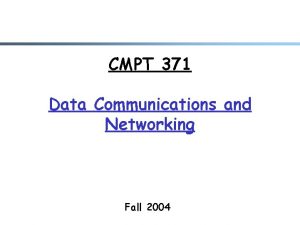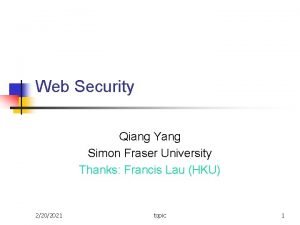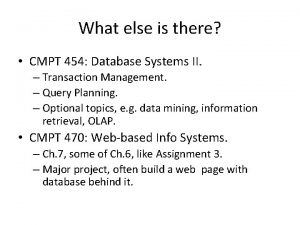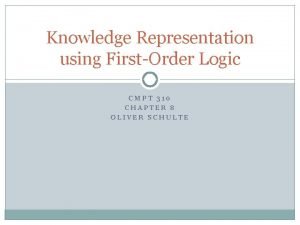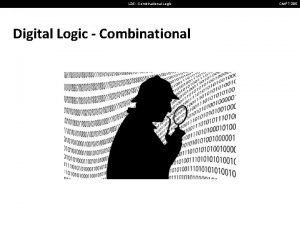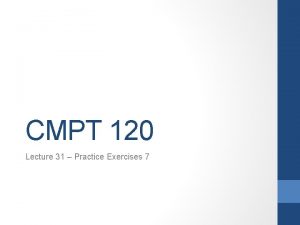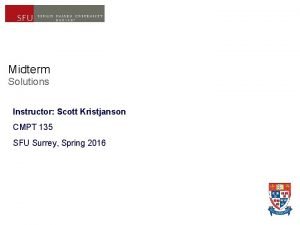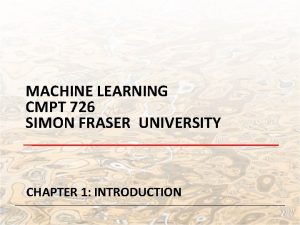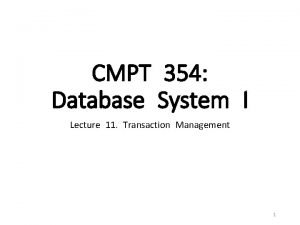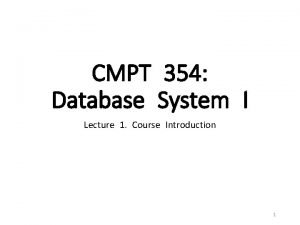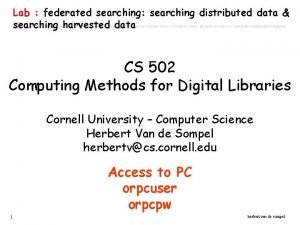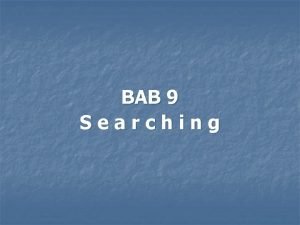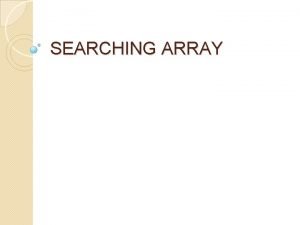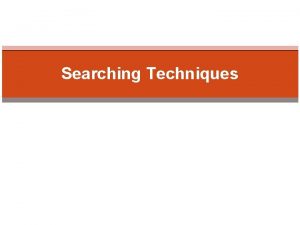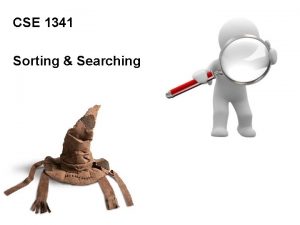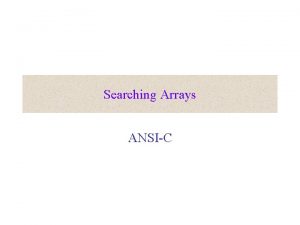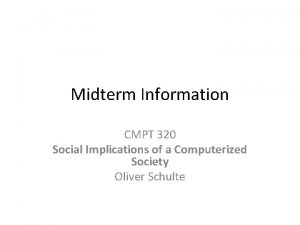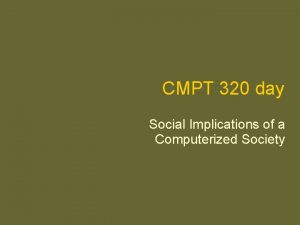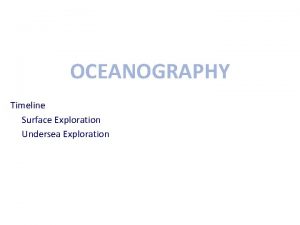Searching as Strategic Exploration CMPT 320 the ACRL



















- Slides: 19

Searching as Strategic Exploration CMPT 320 & the ACRL Information Literacy Framework Holly Hendrigan hah 1@sfu. ca 30 May 2018

§ Assignment recap Today’s talk § Next frame: Searching as Strategic Exploration

§ High consent rate: thank you! § Cursory analysis: thoughtful, articulate answers of a slippery topic Assignment Recap § Upshoot: Few people questioned Twenge’s credentials as an academic § Ph. D, academic career, publication record § BUT: Less agreement with her methodologies, findings § Peer reviewed vs popular source: not good vs bad § Different audiences; different motivations

§ “Searching for information is often nonlinear and Frame: “Searching as strategic exploration” iterative, requiring the evaluation of a range of information sources and the mental flexibility to pursue alternate avenues as new understanding develops. ” § Encompassing inquiry, discovery, and serendipity, searching identifies both possible relevant sources as well as the means to access those sources. § Novice learners may search a limited set of resources, while experts may search more broadly and deeply to determine the most appropriate information within the project scope.

Literature Search Inspired Idea Start Change Focus More Research Start writing More Research Resume Writing Bit more research Give up in disgust; Modify Focus Hand In

• New strategy § Encyclopedias § Books Search strategy § Articles §Constructing a search §Tips for your literature review • Research Don’ts

§ Your topic is “The Smartphone Generation. ” § Activity A: What do you do if you strike out on the term “smartphone? ” What’s in a name? § In other words, what are some other terms you could use to express the same gadget? § Activity B: How do you express the concept of “your generation” in a search? § In other words, what are the terminology options?

§ Alternative to “foraging”: chaining strategy Academic Encyclopedias § follow references from one article as a starting point § often obtained through literature searches or colleagues

Gale Virtual Reference Library

Books (single and multiauthored) § Provides historical context § Provides useful bibliographies § You don’t have to read the entire book! § Book chapters: explainers

§ Search 1: “smartphones” : bad results Library Search (middle column: books) § Search 2: “smartphones – social aspects”: better § Search 3: “i. Gen” (Twenge’s book): look at subject headings § More focused on internet/social media than device

§ Often, results of experiments § Authors of journal articles are faculty members at universities § Magazine / newspaper articles: authors are professional Articles writers § Peer review process: multiple revisions § Subject databases are an efficient way of searching journals on the same topic (eg, engineering, environmental science, psychology, business)

Composing a search string § Pro tip #1: be careful with natural language: don’t overuse § Pro tip#2: Pay attention to subject headings, combine sets of controlled vocabulary

Activity: Academic search Key in “Academic search” in search box Click on “Academic Search” under Databases (on right)

SEARCH 1: “DO SMARTPHONES CAUSE DEPRESSION? ” § Key in this search as a phrase in the search box Which search gives better results? SEARCH 2: SMARTPHONES AND DEPRESSION § Key in the two terms in separate lines

SEARCH 1: “DO SMARTPHONES CAUSE DEPRESSION? ” § Note: Your initial search query did not yield any results. However, using Smart. Text Searching, results were found based on your keywords. § 1082 results Which search gives better results? § (phrase proximity: near 5) SEARCH 2: SMARTPHONES AND DEPRESSION § 204 results § Fields searched: all authors, all subjects, all keywords, all title information (including source title) and all abstracts.

§ Search history: provides view for combining sets § Also search More pro tips § Benefits § Advantages § Positive effect § Positive impact

Practice makes better § “Novice learners may search a limited set of resources, while experts may search more broadly and deeply to determine the most appropriate information within the project scope. ”

Questions? § Email me: hah 1@sfu. ca
 Image search
Image search Acrl diversity alliance
Acrl diversity alliance Cmpt 320
Cmpt 320 Bluebugging adalah
Bluebugging adalah Strategic searching
Strategic searching Analysing the 6 strategic options megxit
Analysing the 6 strategic options megxit Strategic fit vs strategic intent
Strategic fit vs strategic intent Strategic substitutes and strategic complements
Strategic substitutes and strategic complements Strategic management and strategic competitiveness
Strategic management and strategic competitiveness Cmpt225
Cmpt225 Top dop
Top dop Cmpt 470
Cmpt 470 Cmpt 454
Cmpt 454 Cmpt 310
Cmpt 310 Cmpt 295
Cmpt 295 Cmpt 120
Cmpt 120 Sfu grade distribution
Sfu grade distribution Cmpt 726
Cmpt 726 Cmpt 354
Cmpt 354 Sfu cmpt 307
Sfu cmpt 307
